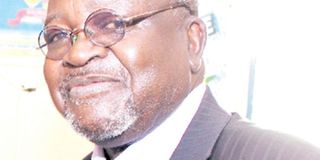Liberation from tribal bondage

Danford Mpumilwa
What you need to know:
This was the question I was asked as I checked into my favourite budget hotel Comfort, straddling the Jivanjee gardens in central Nairobi. Naturally, I did not have an answer to that for the simple reason that I am not very conversant with Kenyan politics and in particular their internal dynamics.
Election fever has gripped Nairobi. Everywhere you go the talk is about forthcoming elections. The question on everybody’s mind is who is going to win the presidency. Is it Raila Odinga and his National Super Alliance (Nasa) Party or Uhuru Kenyatta and his Jubilee Party?
This was the question I was asked as I checked into my favourite budget hotel Comfort, straddling the Jivanjee gardens in central Nairobi. Naturally, I did not have an answer to that for the simple reason that I am not very conversant with Kenyan politics and in particular their internal dynamics.
After checking into my hotel room, I took a cold shower and a few minutes later walked past the adjacent Nakumatt Lifestyle Shopping Mall and entered my favourite restaurant along Koinange Street, Safari Restaurant formerly Kengeles.
I sat at my favourite corner, near the washroom as I watched white collar Nairobians walk in for their afternoon snacks and cocktails. I could tell that most of them were middle class lawyers.
I ordered my Tusker malt beer and sipped slowly as the crowd grew bigger and arguments grew louder and more political. The issue at hand was political rivalry between Raila and Uhuru. But also at hand was the issue of an acute shortage of maize flower, the rising cost of several consumer goods, big time corruption and tribalism.
The patrons at that restaurant knew each other very well as well their political and tribal affiliations. I was the odd man out. No wonder at one stage some of the patrons wanted to know, who I was.
The rescue came from none other than a barman, who for obvious reasons, knows me and my favourite drink and food. “He is a Tanzanian,” he told the counter group.
Suddenly, the whole crowd became silent and all eyes were focussed on me. “Oh! You are from the land of Magufuli,” they asked. As I answered in the affirmative, they immediately announced that all my drink and food bills would be paid by them. Thanks Magufuli!
They were delighted that I indeed came from the land of Magufuli. A man they admired for his tough stand against corruption, among others. How did we discover him and where did he come from, his tribe, his education etc? They asked.
I tried to answer all their questions, though I was not very sure about his tribe. This was a shock to them. How could he be elected without a strong tribal background? They wondered.
That is when it dawned on me that Bongolanders do not care much about one’s tribe. For example, I always find it difficult to even describe my tribe. My father is half Bena and half Wanji, while my mother is half Sangu and Nyika. So, who am I? And it gets worse - the mother of my first daughter is half Kerewe and half Sukuma. So, what is the tribe of my daughter?
Actually I have come to think that not many Tanzanians even know the tribe of our former presidents.
Apart from Julius Nyerere, whose tribe was published in history text books for obvious reasons, not many Bongolanders know the tribes of the second President Ali Hassan Mwinyi or the third Benjamin Mkapa and even the fourth Jakaya Kikwete. It is not a big deal.
Narrating this to my Nairobi booze benefactors was a pleasure. I could see that they were feeling sorry for themselves for being so tribal in their approach to politics and life. As a teacher of mine at my former Mkwawa High School stated “success can only come after one liberates oneself from the tribal bondage”.
Are we ready for this major leap to success?
The author is a veteran journalist and media consultant based in Arusha




